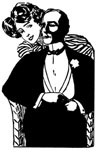
Those Heartless Social Scientists
HOMELESS VOYEURS?
Chesterton thought a man could only understand himself — and Mankind — by going home, and that there are two ways for a man to go home: He might get home by staying home, or he could walk around the whole world until he came back to the same spot.
A home is different from a mere house; a home is the oldest of communities — it comes before straw, sticks, bricks, and politics. The home is best explained as a place of the heart — the place of our bearing and the place where we receive our bearings.
Chesterton’s advice to the man who would seek to understand Man by traveling about the world and observing other peoples is that it would do him well to be snowed in on his own street, where he would “step into a much larger and much wilder world [than he had] ever known.” This will come as no surprise to those who understand the home to be the place where we have been cast with many people we did not choose. The home is the wildest of kingdoms.
My home is such a kingdom. It has a population of six, and comes with a budget, a nutritionist, a foreign policy, 07a crucifix, a garden, transportation, education, music, quarrels, games, births, picnics, funerals, livestock, technology, laundry, sewing, a fence, a few gallons of milk a day, and loyalty.
You May Also Enjoy
Get rid of 'Rome' and what will be left in the end is California.
Zondervan, publisher of the NIV, planned a so-called inclusive-language version of the NIV that would eventually replace it, but was pressured to stop.
Anne Barbeau Gardiner takes on an author who has "made a career of treating the Bible sacrilegiously" and sees power, not Logos, as the ultimate reality.

